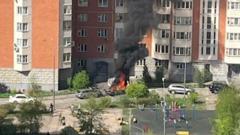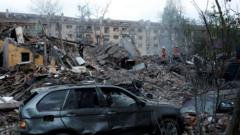In an interview with BBC Radio 4, Kyiv Mayor Vitali Klitschko indicated that Ukraine might need to consider giving up territory to facilitate peace negotiations with Russia. While emphasizing that such concessions may only lead to temporary peace, Klitschko affirmed the Ukrainian people's resistance to occupation. His statements come in the context of escalating violence and diplomatic tensions involving U.S. President Trump and Ukrainian President Zelensky.
Kyiv Mayor Suggests Territorial Concessions for Peace Amid Ongoing Conflict

Kyiv Mayor Suggests Territorial Concessions for Peace Amid Ongoing Conflict
Vitali Klitschko warns of potential land concessions as a means to achieve temporary peace with Russia, igniting debates on the future of Ukrainian sovereignty.
In the wake of a recent, deadly missile and drone attack on Kyiv, which resulted in 12 fatalities, Klitschko remarked on the harsh realities confronting Ukraine amid the ongoing war with Russia. Despite admitting the challenging possibility of conceding land, he emphasized that this would not equate to acceptance of Russian occupation. Klitschko, a significant political figure and former boxing champion, positioned himself as a voice of concern regarding national governance and safety while noting he occupies a crucial role in the capital’s administration.
Reflecting on the tumultuous relationship with U.S. President Trump, Klitschko suggested that top-level discussions regarding peace negotiations would be more productive if conducted away from the spotlight, citing a public confrontation between Trump and Zelensky earlier this year as an exemplification of this sentiment. He pointed out discrepancies in each leader's stance on Crimea, a focal point in ongoing discussions about territorial integrity and international pressure.
Zelensky, known for his firm stance against accepting any Russian claims of territory, including Crimea—which was annexed in 2014—has faced criticism from Trump regarding the peace process. The diverging perspectives among these leaders highlight the complexities of diplomacy in an environment fraught with military aggressions and public demands for accountability.
As international concerns grow regarding the United States' diplomatic posture towards Russia, Klitschko emphasizes that any proposed solutions must fundamentally respect Ukraine's sovereignty and the sentiments of its people, even as harsh realities may require near-term sacrifices for long-term peace.
Reflecting on the tumultuous relationship with U.S. President Trump, Klitschko suggested that top-level discussions regarding peace negotiations would be more productive if conducted away from the spotlight, citing a public confrontation between Trump and Zelensky earlier this year as an exemplification of this sentiment. He pointed out discrepancies in each leader's stance on Crimea, a focal point in ongoing discussions about territorial integrity and international pressure.
Zelensky, known for his firm stance against accepting any Russian claims of territory, including Crimea—which was annexed in 2014—has faced criticism from Trump regarding the peace process. The diverging perspectives among these leaders highlight the complexities of diplomacy in an environment fraught with military aggressions and public demands for accountability.
As international concerns grow regarding the United States' diplomatic posture towards Russia, Klitschko emphasizes that any proposed solutions must fundamentally respect Ukraine's sovereignty and the sentiments of its people, even as harsh realities may require near-term sacrifices for long-term peace.






















